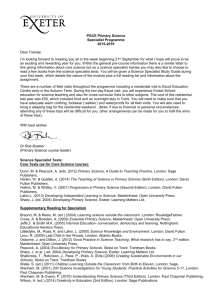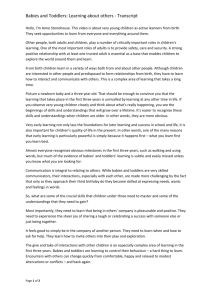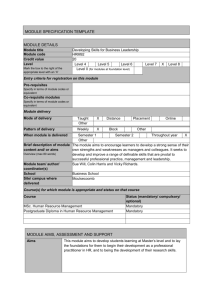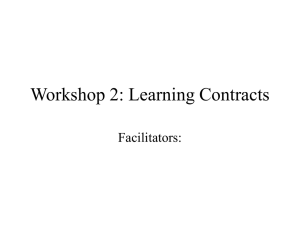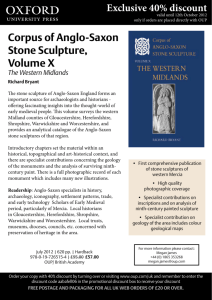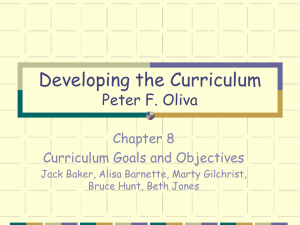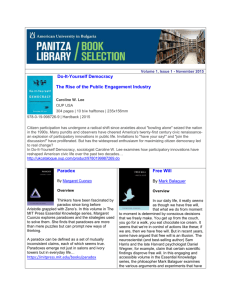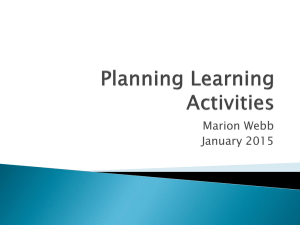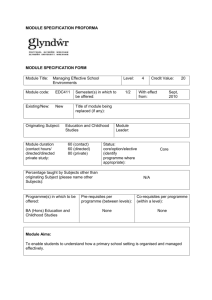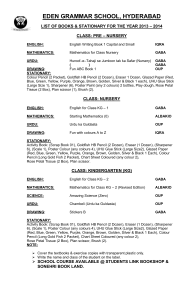Assessment task - University of Brighton
advertisement
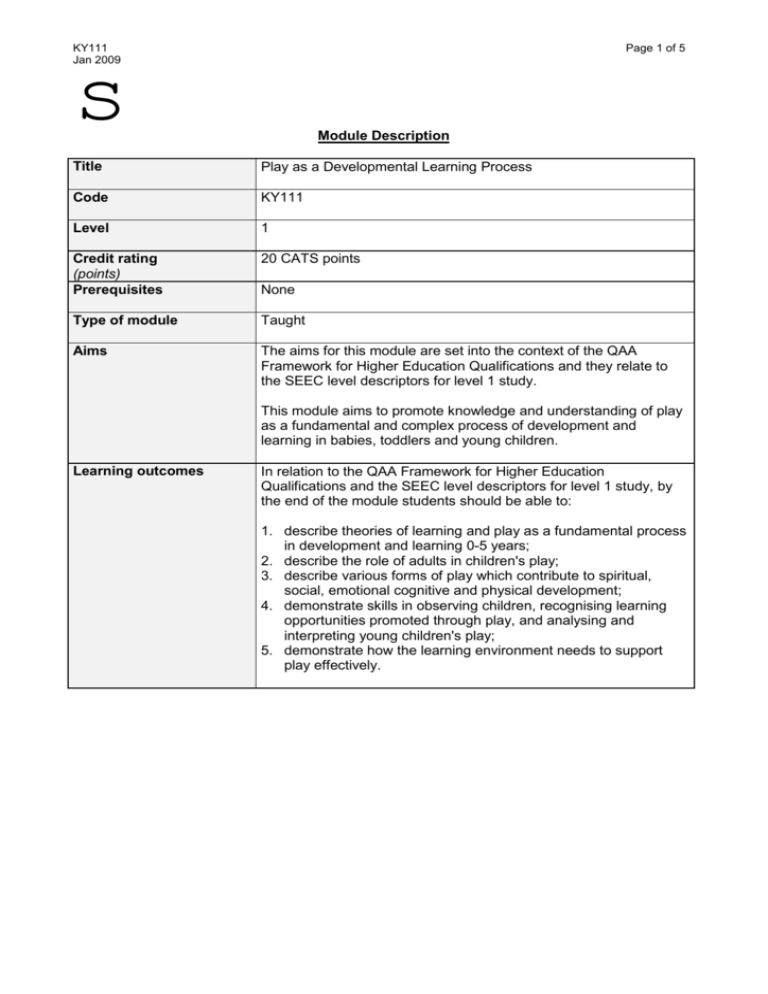
KY111 Jan 2009 Page 1 of 5 s Module Description Title Play as a Developmental Learning Process Code KY111 Level 1 Credit rating (points) Prerequisites 20 CATS points Type of module Taught Aims The aims for this module are set into the context of the QAA Framework for Higher Education Qualifications and they relate to the SEEC level descriptors for level 1 study. None This module aims to promote knowledge and understanding of play as a fundamental and complex process of development and learning in babies, toddlers and young children. Learning outcomes In relation to the QAA Framework for Higher Education Qualifications and the SEEC level descriptors for level 1 study, by the end of the module students should be able to: 1. describe theories of learning and play as a fundamental process in development and learning 0-5 years; 2. describe the role of adults in children's play; 3. describe various forms of play which contribute to spiritual, social, emotional cognitive and physical development; 4. demonstrate skills in observing children, recognising learning opportunities promoted through play, and analysing and interpreting young children's play; 5. demonstrate how the learning environment needs to support play effectively. KY111 Jan 2009 Content Page 2 of 5 To include: Learning and teaching strategies Definitions and forms of play both inside and outdoors Theories of how young children learn and the contribution of play as a fundamental learning process Ideologies, historical perspectives on play as a learning process Current research into play and learning Areas and stages of young children's development in relation to play Play and spiritual, moral, social and cultural development The role of adults in children's play Resources for promoting learning through play in the early years environment Skills in observing, analysing and interpreting the learning process in young children's play Leading and supporting an effective play environment Contact Time: Tutor-led seminars Feedback on set material and fieldwork A range of directed tasks to be undertaken in the workplace Video analysis and work with children A visit to a Foundation Stage setting of excellence Non-contact Time: Background reading Follow-up from and preparation for taught sessions Preparation for and analysis of observations in Foundation Stage settings Contribution to the studentcentral discussion forum Use of the Learning Journal for critical commentary KY111 Jan 2009 Learning support Page 3 of 5 Books: Booth, T., Ainscow, M. & Kingston, D. (2006) Index for Inclusion: developing learning, participation and play in early years Bristol: CSIE Broadhead, P. (2004) Early Years Play and Learning: developing social skills and co-operation London: RoutledgeFalmer Bruce T. (2001) Learning through play: babies, toddlers and the foundation years London: Hodder & Stoughton Carnall, C. (2007) Managing Change in Organisations (5th ed), Harlow: Prentice Hall Drake, J. (2001) Planning Children’s Play & Learning in the Foundation Stage London: David Fulton Publishers Forbes, R. (2004) Beginning to Play: young children from birth to three years Maidenhead: OUP Glenn, A., Cousins, J. & Help, A. (2006) Tried and Tested Strategies: an inclusive approach: play and learning in the early years London: David Fulton Hall, N. & Robinson, A. (2003) Play in the Primary Curriculum London: David Fulton Hendy, L. & Toon, L. (2001) Supporting drama and imaginative play in the early years Buckingham: OUP Holland, P. (2003) We don’t play with guns here: War, weapon and superhero play in the early years Maidenhead: OUP Leicester, M. (2006) Early Years Stories for the Foundation Stage: ideas and inspiration for active learning New York: Routledge MacIntyre, C. (2001) Enhancing Learning through Play: a developmental perspective for early years settings London: David Fulton Manning-Morton, J. & Thorp, M. (2003) Key Times for Play: the first three years Maidenhead: OUP Moyles, J. (2005) The Excellence of Play [2nd Ed.] Maidenhead: Open University Press Tucker, K. (2005) Mathematics through Play in the Early Years: activities and ideas London: Paul Chapman Publishing Journals: Child Development Early Education European Early Childhood Education Research Journal Infant Projects International Journal of Early Years Education Journal of Early Childhood Research Under Five Contact Electronic Sources: (accessed Jan 2009) From studentcentral, follow the link to: Online library Select: Browse by Subject Choose: Education Choose: Teacher Education And follow the links to the section on Early Years KY111 Jan 2009 Assessment task Page 4 of 5 Assessment will be in the context of the University of Brighton Assessment Policy and the Faculty Code of Practice in Assessment, and students will be required to complete the following task: Students will plan and set up a play/role-play area, with regard to children’s interests and learning opportunities, writing a critical evaluation of the children’s responses and ways forward. (2,500 words) This assignment will be marked on a percentage basis. Referral: Rework original assignment Assessment criteria General criteria for assessment are framed by the SEEC descriptors for level 1. Against specific criteria, credit will be awarded for: knowledge and understanding of play as a fundamental process for babies, toddlers and young children's development and learning (LO1, LO2); the ability to use observations of children's play purposefully to identify learning opportunities and evaluate learning processes (LO4); knowledge and understanding of different forms of play with an emphasis on the type of play evaluated in the assignment (LO3); the ability to relate theory to practice and to create an effective learning environment reflecting knowledge of the Early Years Foundation Stage Principles (LO5). All learning outcomes must be achieved in order to pass the module at the threshold level. Brief description of module content and/or aims for publicity This module provides a foundation for the study of the role of play and its significance in children's development and learning. Its aim, through the consideration of forms of play, is to promote knowledge and understanding of play as a fundamental and complex process. The knowledge, and skills developed through observation and evaluation, will enable students to utilise and extend their understanding of play in this, and later modules. Area examination board to which module relates Module team/authors/coordinator Normal duration Early Years Care and Education Site where delivered Falmer Date of first approval January 2009 Date of last revision N/A Barbara Murray and Denise Kingston One semester (2) KY111 Jan 2009 Page 5 of 5 Date of approval of this version Version number January 2009 Replacement for previous module Route for which module is acceptable and status in that Route Course(s) which module is acceptable and status in course School home KY104 (for cohort starting April 2009 or later) External examiner(s) TBA 1 FdA Early Years Care and Education – required FdA Early Years Care and Education – required School of Education

